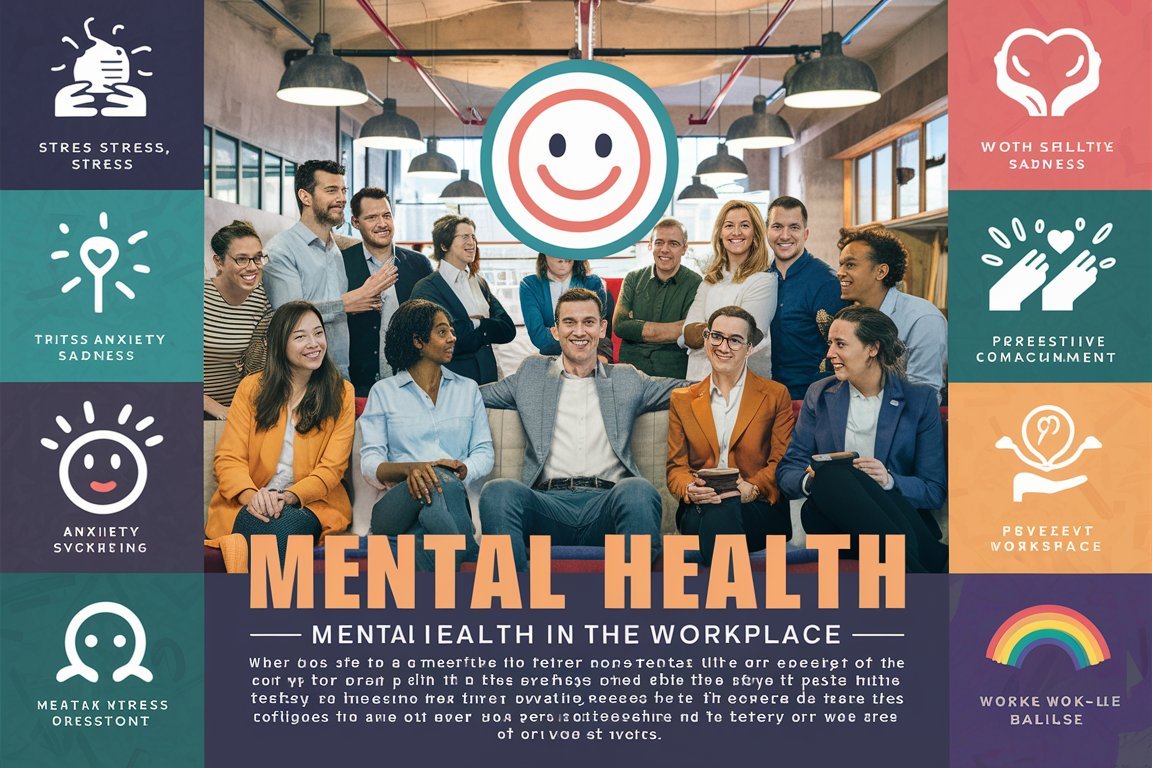Mental Health in the Workplace: Creating a Supportive Environment
Hey there, young minds! Today, we’re going to talk about something really important – mental health in the workplace. Now, I know you might be thinking, “But I’m just a kid! Why do I need to know about workplace stuff?” Well, here’s the thing: even though you’re not working in an office yet, understanding mental health is super important for everyone, no matter how old you are.
First of all, let’s talk about what mental health actually means. Mental health is all about how we think, feel, and act. It’s about our emotional, psychological, and social well-being. Just like we need to take care of our physical health by eating healthy foods and exercising, we also need to take care of our mental health by doing things that make us feel good and help us cope with stress.
Why is Mental Health Important in the Workplace?
So, why is mental health such a big deal in the workplace? Well, think about it this way: when you’re at school, you probably spend a lot of time there, right? You have to focus on your lessons, do your homework, and get along with your classmates and teachers. It’s kind of like a job, in a way.
Now imagine if you were feeling really sad, anxious, or stressed out all the time while you were at school. It would probably be pretty hard to concentrate on your work or have fun with your friends, right? The same thing happens for adults in the workplace.
When people are struggling with mental health issues like depression, anxiety, or burnout, it can make it really hard for them to do their job well. They might have trouble focusing, making decisions, or even just showing up to work at all.
But here’s the thing: mental health issues are super common, and they can happen to anyone. In fact, studies show that one in four people will experience a mental health problem at some point in their life. That’s a lot of people!
So, it’s really important for workplaces to create a supportive environment where people feel safe and comfortable talking about their mental health and getting the help they need.
Creating a Supportive Environment
Okay, so how can workplaces create a supportive environment for mental health? Here are a few ideas:

Encourage Open Communication
One of the most important things workplaces can do is encourage open communication about mental health. This means creating a culture where people feel safe and comfortable talking about their struggles and asking for help when they need it.
Managers and leaders can set the tone by being open and honest about their own mental health experiences and encouraging others to do the same. They can also make sure that everyone knows about the mental health resources and support available to them, like employee assistance programs or counseling services.
Provide Mental Health Education and Training
Another way workplaces can support mental health is by providing education and training for employees and managers. This can include things like:
- Workshops on stress management, resilience, and self-care
- Training on how to recognize signs of mental health problems in themselves and others
- Education on how to have supportive conversations about mental health
- Information on where to go for help and support
By providing this kind of education and training, workplaces can help reduce the stigma around mental health and give people the tools they need to take care of themselves and support others.
Offer Flexible Work Arrangements
Sometimes, people with mental health issues might need a little extra flexibility in their work arrangements. This can include things like:
- Working from home some days
- Having a flexible start or end time
- Taking mental health days when needed
- Adjusting workloads or deadlines when things get overwhelming
By offering these kinds of flexible arrangements, workplaces can show that they understand and support the needs of their employees.
Create a Positive Work Culture
Finally, one of the most important things workplaces can do to support mental health is to create a positive work culture. This means fostering an environment where people feel valued, respected, and supported.
Some ways to create a positive work culture include:
- Celebrating successes and accomplishments
- Encouraging work-life balance and self-care
- Providing opportunities for social connection and team-building
- Addressing conflicts and issues in a constructive way
- Showing appreciation and recognition for hard work and dedication
When people feel like they’re part of a positive, supportive work culture, they’re more likely to feel good about themselves and their work, which can have a big impact on their mental health.
The Benefits of a Supportive Environment
So, why is it so important for workplaces to create a supportive environment for mental health? Well, there are actually a lot of benefits – both for individuals and for the workplace as a whole.
For Individuals:
- Improved mental health and well-being
- Increased job satisfaction and engagement
- Better work-life balance and less stress
- More support and resources for managing mental health issues
- Reduced stigma and discrimination around mental health
For the Workplace:
- Increased productivity and performance
- Lower absenteeism and turnover rates
- Better team morale and collaboration
- Enhanced reputation as a supportive and inclusive workplace
- Reduced healthcare costs and disability claims
In other words, when workplaces prioritize mental health and create a supportive environment, everyone wins!
What Can You Do?
Okay, so now that we know why mental health is so important in the workplace and what workplaces can do to support it, you might be wondering: what can I do? Even though you’re not in the workplace yet, there are still things you can do to support your own mental health and the mental health of those around you.
Take Care of Yourself
First and foremost, it’s important to take care of yourself and your own mental health. This means doing things like:
- Getting enough sleep and exercise
- Eating healthy foods and staying hydrated
- Taking breaks when you need them
- Doing things you enjoy and that make you feel good
- Talking to someone you trust when you’re feeling stressed or overwhelmed
By taking care of yourself, you’ll be better equipped to handle whatever challenges come your way – both now and in the future.
Be a Good Friend
Another way you can support mental health is by being a good friend to those around you. This means:
- Listening without judgment when someone is struggling
- Offering support and encouragement
- Helping friends find resources or support when they need it
- Including everyone and celebrating differences
- Standing up against bullying or discrimination
When we create a culture of kindness and support in our friendships and communities, it can have a ripple effect that spreads far and wide.
Speak Up for Change
Finally, even though you’re young, you have the power to speak up for change and advocate for mental health support in your school and community. This might mean:
- Talking to your teachers or principal about mental health resources and support at school
- Starting a mental health awareness club or campaign
- Writing letters to local leaders or representatives about the importance of mental health funding and resources
- Sharing your own experiences and stories to help reduce stigma and encourage others to seek help
Remember, your voice matters, and you have the power to make a difference in the world around you.
Putting It All Together
Phew, that was a lot of information! But I hope you’re feeling more informed and empowered to support mental health – both in your own life and in the world around you.
Remember, mental health is just as important as physical health, and it’s something we all need to prioritize and support. By creating a culture of openness, education, flexibility, and positivity, we can make a big difference in the lives of those around us.
And even though you’re not in the workplace yet, there are still things you can do to support your own mental health and the mental health of those around you. By taking care of yourself, being a good friend, and speaking up for change, you can help create a world where everyone feels supported and valued.
So, let’s all work together to prioritize mental health and create a more supportive, inclusive world for everyone. Together, we can make a difference!













1 Comment